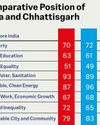Clean India campaign is yet to address casteism

It's not a spectre that is haunting India. It’s a tangible, evil-smelling, health-impairing, socially divisive reality: waste. India’s battle with “waste”, now led by the dashing sowars of swachh Bharat, faces two formidable obstacles unique to India. The first is magnitude. No other country in the world (excluding islands and city-states) has so great a population density, coupled with the capacity to produce so much discarded “stuff”.
True, China has more people, but China is larger than India. Population density in China is about 150 people to the square kilometre; in India, it is closer to 450. The United states produces more waste—250 million metric tonnes a year, according to one estimate. This greatly exceeds estimates of India’s annual production of 65 million tonnes. But the Us has more room to dump it: only 35 people to the sq km. Bangladesh has a greater population density, but with nowhere near India’s industrial capacity to dig things up, throw things away and manufacture all the pollution-creating components of 21st-century life.
Appropriate technologies and adaptive policies can overcome many problems of magnitude. But India’s other unique obstacle to a cleaner environment is much tougher. It is caste: the idea that people are born to the task of doing the nation’s dirty work. As Bhasha singh writes in her powerful book Unseen, “the caste system aids the belief that all work associated with filth is the lot of the Dalits.”
This story is from the {{IssueName}} edition of {{MagazineName}}.
Start your 7-day Magzter GOLD free trial to access thousands of curated premium stories, and 9,000+ magazines and newspapers.
Already a subscriber ? Sign In
This story is from the {{IssueName}} edition of {{MagazineName}}.
Start your 7-day Magzter GOLD free trial to access thousands of curated premium stories, and 9,000+ magazines and newspapers.
Already a subscriber? Sign In

Vishnu Deo Sai proving to be 'Iron Man' in The Fight against Naxals
Chhattisgarh has begun a new era, leaving behind the dark legacy of Naxal violence and paving the way for peace and development

From Village Leader to Chief Minister: The Journey of Vishnu Deo Sai
Recognised for his exceptional leadership qualities, Sai was elected unopposed as the Sarpanch of his village, Bagiya, in 1990 and also won the Tapkara Assembly seat in the same year on a BJP ticket

The progress of each individual is the true progress of the state, that is now the motto of Chhattisgarh
The treasury has been opened for women to improve healthcare. The Vishnu Deo government wants to promote every part of the state and take it forward holistically so that no one is left behind on the path of development

Chhattisgarh's Remarkable Progress in Sustainable Development
Chhattisgarh has emerged as a frontrunner in sustainable development for 2023-2024, achieving significant improvements in the Sustainable Development Goal (SDG) rankings.

Chhattisgarh Will Neither Halt Nor Pause
Chhattisgarh has received approval for four new railway projects while Union Road Transport and Highways Minister Nitin Gadkari has sanctioned Rs 11,000 crore for development of major roads in the state

E-Office Revolutionises Governance in Chhattisgarh
An online e-office system is being developed for all departments and ministries so that complaints of corruption, file delays and irregularities can be addressed at the very outset

Empowering Youth for A Prosperous Future
Chief Minister Sai is committed to transforming Chhattisgarh into a developed state by 2047, with equal and abundant opportunities in healthcare, education, and livelihood at its core

Steps To Bring Industry, Business and Investors Together
Vishnu Deo Sai Government's vision is driving industrial growth for a prosperous state

One Farmer, A Hundred Smiles
The Sai government is steadfast in its mission to bring a smile to every farmer's face, prioritising both small and large farmers alike.

Layers Of Lear
Director Rajat Kapoor and actor Vinay Pathak's ode to Shakespeare is an experience to behold